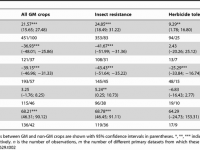Despite the rapid adoption of genetically modified (GM) crops by farmers in scientifically advancedc countries, controversies about the 1970s version of genetic engineering (successfully used commonly since the 1990s) continue. For every victory of the Rainbow Papaya in Hawaii, environmentalists insist dozens of times there is uncertainty and that only older genetic engineering like mutagenesis - mutating seeds with chemicals and radiation - should be allowed.
Tech
Many people do not get enough vitamin D. Brittle bones and an increased risk of respiratory diseases can be the result of a vitamin D deficiency. A research group at Martin Luther University Halle-Wittenberg (MLU) and the Max Rubner-Institut has now identified a new, previously unknown source of vitamin D2: cocoa and foods containing cocoa have significant amounts of this important nutrient. According to the researchers, cocoa butter and dark chocolate have the highest amount of vitamin D2. They recently published their results in the journal "Food Chemistry".
A new auto-commentary published in SLAS Technology looks at how an emerging area of artificial intelligence, specifically the analysis of small systems-of-interest specific datasets, can be used to improve drug development and personalized medicine.
Experts at a prestigious medical conference hosted by the American Geriatrics Society (AGS) and funded by the National Institute on Aging (NIA) hope their work--reported today in the Journal of the American Geriatrics Society--will have colleagues seeing eye-to-eye on an important but under-researched area of health care: The link between impaired vision, hearing, and cognition (the medical term for our memory and thinking capabilities, which are impacted as we age by health concerns like
Coffee is one of Brazil's biggest crops. Brazil's favorable climate helps coffee beans ripen and be ready for picking during a concentrated period of weeks. This makes mechanical harvesting an economically reasonable choice.
So much mechanization, however, comes with its challenges. Tiago de Oliveira Tavares is an agronomist at Sao Paulo State University in Brazil. He and his colleagues perked up at the opportunity to brew some coffee-growing solutions.
Berkeley -- Human-caused climate change has exposed U.S. national parks to conditions hotter and drier than the rest of the nation, says a new UC Berkeley and University of Wisconsin-Madison study that quantifies for the first time the magnitude of climate change on all 417 parks in the system.
Without action to limit greenhouse gas emissions, many small mammals and plants may be brought to the brink of extinction by the end of the century, the study shows.
Tokyo, Japan - Researchers from Tokyo Metropolitan University have discovered a new way of controlling the drying patterns formed by re-crystallizing salt. They found that the coffee ring effect can be used to pin the edge of drying droplets, creating a range of different geometric patterns. The same principles may be applied to understand and improve the adhesion of printer ink to surfaces and the manufacture of film-based devices.
Most patients diagnosed with type 2 diabetes are treated with a "one-size-fits-all" protocol that is not tailored to each person's physiology and may leave many cases inadequately managed. A new study by scientists at the Broad Institute of MIT and Harvard and Massachusetts General Hospital (MGH) indicates that inherited genetic changes may underlie the variability observed among patients in the clinic, with several pathophysiological processes potentially leading to high blood sugar and its resulting consequences.
Each year, fishermen harvest more than $500 million worth of Atlantic sea scallops from the waters off the east coast of the United States. A new model created by scientists at the Woods Hole Oceanographic Institution (WHOI), however, predicts that those fisheries may potentially be in danger. As levels of carbon dioxide increase in the Earth's atmosphere, the upper oceans become increasingly acidic--a condition that could reduce the sea scallop population by more than 50% in the next 30 to 80 years, under a worst-case scenario.
Land-based bird populations are becoming confined to nature reserves in some parts of the world - raising the risk of global extinction - due to the loss of suitable habitat, according to a report led by UCL.
Researchers analysed biodiversity in the area known as Sundaland, which covers the peninsula of Thailand, Borneo, Malaysia, Sumatra, Java and Bali, one of the world's most biologically degraded regions.
Sept. 21, 2018--Burning wood or coal to cook food is associated with increased risk of hospitalization or dying from respiratory diseases, according to new research conducted in China and published online in the American Thoracic Society's American Journal of Respiratory and Critical Care Medicine.
A new special issue of SLAS Technology showcases life sciences researchers who are pioneering the use of powerful yet accessible and low-cost IoT technologies in their laboratories. Ten articles illustrate how IoT is being used to optimize factors such as throughput, cost, uptime and result quality.
A new outbreak of a rare but preventable eye infection that can cause blindness, has been identified in contact lens wearers in a new study led by UCL and Moorfields Eye Hospital researchers.
The research team found a threefold increase in Acanthamoeba keratitis since 2011 in South-East England.
ATLANTA--Commitment to democratic values is the strongest predictor of climate change concern globally, Georgia State University faculty have found in a new study comparing climate change attitudes across 36 countries, including the U.S.
Enthusiasm for an emerging digital health tool, the smart pill, is on the rise but researchers at the University of Illinois at Chicago have published a paper in the American Journal of Bioethics that cautions health care providers and policymakers to slow down when it comes to allowing this technology in patient care settings.
